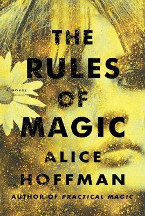The rules of magic by Alice Hoffman

Simon and Schuster, 2017. ISBN 9781471168987
(Age: 14 - adult) Recommended. This novel takes the reader into a
world of magical possibility! Magic 'works' in this story of family,
love, loyalty, jealousy, war and peace. Deeply embedded in the New
York of the past, its settings are rich in detail, its stories and
characters resonating with anyone who loves a good plot set in an
interesting and vibrant city.
Plunged into a world of different possibilities we are told that,
through magic, things can be changed - and sometimes revenge can be
exacted on those who have hurt others. Grounding her story firmly in
the idea of witchcraft as a gift to be used carefully and
intelligently, Hoffman describes the witches as understanding the
extraordinary aspects of human behaviour - and who know how to use
the aspects and matter of the world to bring about change.
Hoffman's characters are deftly drawn, and so comfortably human that
it would be impossible to not be convinced of their authenticity. We
are drawn deeply into the world of the novel, reading about the
violence, hatred and fear that some characters endure, in America
and in Europe during the terrible conflict of the Second World War.
The comfort and healing that is offered by witchcraft is evident in
the narrative - whether by medical intervention, nursing, magic or
love, or a combination of these gifts. Through her superb
characterisation, her deft handling of situation, and her
description of how magic works, Hoffmann imbues this world with
credibility.
Accepting the magic or suspending disbelief, in this captivating and
enjoyable novel we discover a fine tribute to human endeavour. At
its heart it is about people and families in good and bad times, and
about how we find ways to cope during such times. This narrative
glimmers with the possibility of forgiveness, love and loyalty in a
world where kindness is often scarce. I would recommend it as a
well-constructed narrative that addresses important human issues -
suitable for high school students and adults.
Liz Bondar